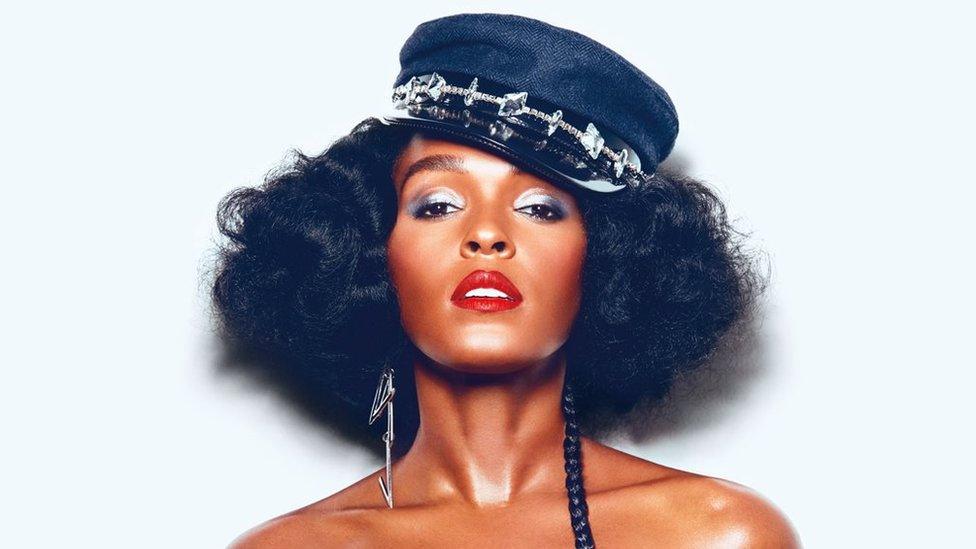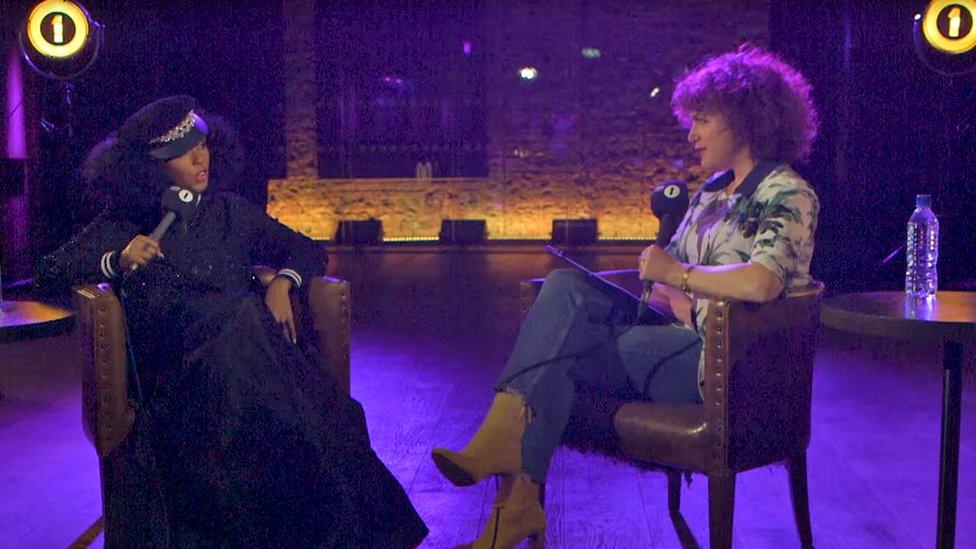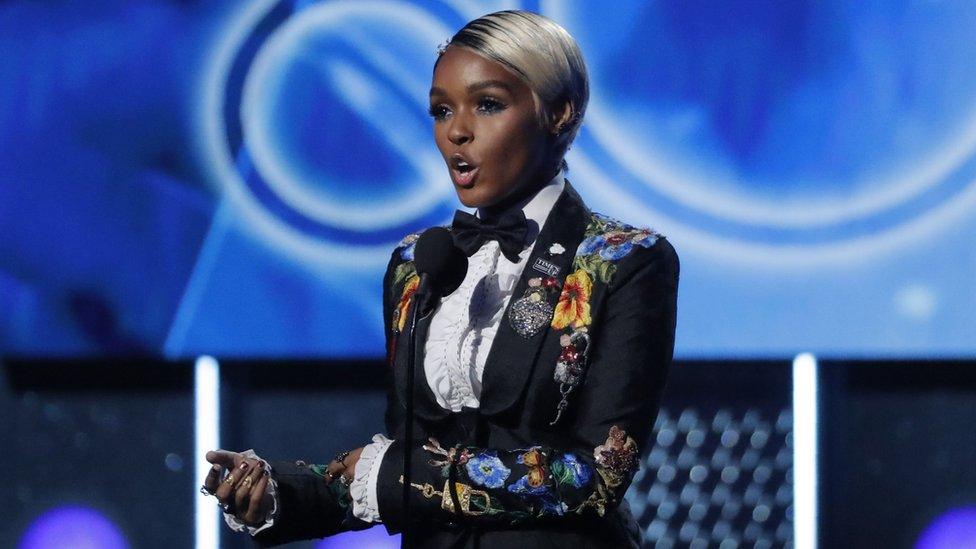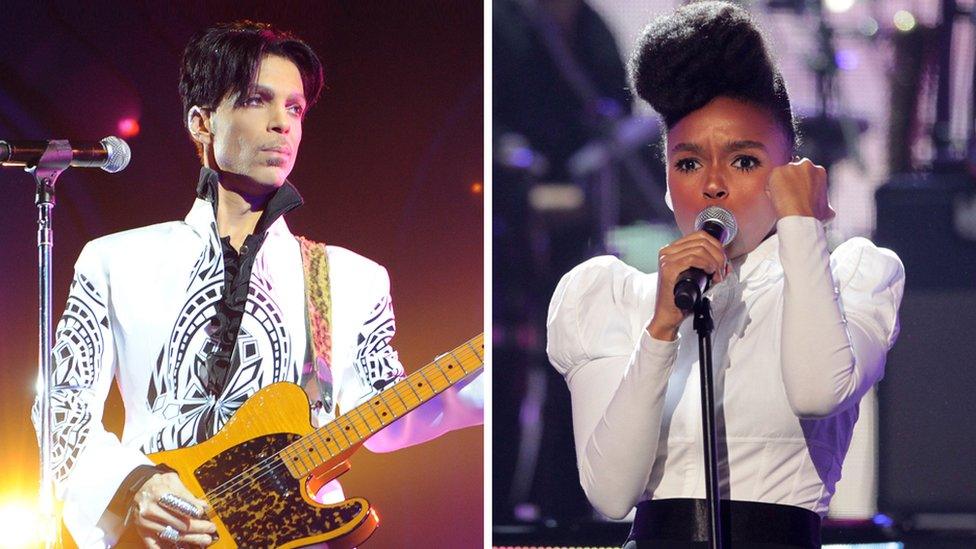Why Janelle Monae is 'standing up to bullies' on her new album
- Published

The star addresses social and sexual politics on her new album, Dirty Computer
Janelle Monae has rarely avoided the opportunity to address inequality.
The R&B star's first three albums form a pointed dialogue about freedom, class, and acceptance - albeit in a futuristic, sci-fi setting.
Her latest record, though, is firmly rooted in the present day, with the star responding to the political and social upheavals in the US.
"There were a lot of times I would stop recording [and] I would be deeply upset, angry," she told BBC Radio 1.
"Living over in America and feeling like the people I love were pushed to the margins of society by the leader of the free world and that regime.
"You do have to stand up for those who can't often stand up for themselves - so I do feel a responsibility to knock the hell out of the bully."
'We are on a shift change'
The star set out her stall with the album's first single, Django Jane, external, a bold, street-smart banger packed with political and feminist discourse.
"They been trying hard just to make us all vanish," she raps at one point. "I suggest they put a flag on a whole 'nother planet".
The star said she'd recorded the song as a "response to the sting of feeling like my rights as a young black woman... are constantly being trampled on".
"I'm angry at many of the things that I hear coming out of the mouths of people in the position of power," she told Annie Mac. "I'm tired of the abuse of power. I'm tired of so many things.
"But at the end of the day, I do believe that we are on a shift change. Women are uniting, we're realising we're stronger together, we're more powerful together, that we really can get [things] done when we are aligned - and so Django Jane was important to say that."

The star was speaking exclusively to BBC Radio 1's Annie Mac
The star isn't just making these statements in her lyrics. Django Jane feels like a companion piece to her recent screen roles in Moonlight and Hidden Figures, while Monae's Fem The Future, external movement predates both Me Too and Time's Up.
The star also addressed sexual inequality with an impassioned speech at this year's Grammy Awards, telling the gathered executives: "We come in peace, but we mean business."
Looking back on the moment, she remembers feeling "nervous but eager" about taking a stand.
But her speech was quickly overshadowed by Grammy chief Neil Portnow who, asked about the lack of female winners at the ceremony, commented that women "need to step up".
Monae counters that the industry needs "systemic" and "structural" changes to promote and protect women.
'Men need to stand up'
"It's not like we don't have the talent to be music producers or engineers or run record labels," she told Radio 1.
"It's the lack of opportunity, it's the lack of hiring, it's the lack of having women present in these rooms helping make these decisions.
"Statistics already show that when women are in positions of power, sexual harassment go down immensely.
"We really are going to have to have conversations - not just as women, but the men are going to have to have these conversations with us,
"They're going to have to ally up with us, they're going to have to check each other in these boys' club rooms, they're going to have to stand up for us in ways that I don't think they have.
"And this is not to group all men together - 'cause not every man is the problem - but you need to recognise the problem and be unafraid to check the problem."

The star wore a white rose lapel pin to the Grammys in support of the #MeToo movement
Monae has promoted her new album, Dirty Computer, with a dramatic trailer attached to Marvel's blockbuster superhero film Black Panther.
But the first taste of the music came at a private listening party last week.
Dressed in her trademark black and white, the 32-year-old took over a bar in central London, dancing her way through a crowd of specially-invited guests, and pulling some (mostly) willing volunteers up to gyrate alongside her.
The event showcased the fun side of the album, which sees Monae exploring sexual liberation as often as her politics, channelling the spirit of her mentor and former collaborator, Prince.
"Having his support and his belief and his confidence meant everything to me," she told Annie Mac.
"He never tried to encourage me to be like him, or to write music like him. It was always, 'You have something special. I'm here if you need me, but I love what it is that you do.'"

Prince appeared on Monae's last album, The Electric Lady, and took her on tour with him
But she also confessed to being frightened by the star's stage presence as a child.
"Prince, you know growing up, was always other-worldly to me, to a point where I was scared of him.
"When I would see his videos on TV they would make me very scared and mainly because I just had never seen a black man express himself in the way that Prince did. He was so free.
"And maybe it was because I was scared of myself. Maybe it was like something that I saw in him that I wasn't ready to tap into and I think it's that freedom.
"You got that when you looked at him, when you listened to him."
Allow YouTube content?
This article contains content provided by Google YouTube. We ask for your permission before anything is loaded, as they may be using cookies and other technologies. You may want to read Google’s cookie policy, external and privacy policy, external before accepting. To view this content choose ‘accept and continue’.
The single Make Me Feel, external, released at the same time as Django Jane, sounds like Monae's tribute to Prince - full of choppy guitar licks and wibbly 80s synths, with lyrical nods to the star's free, and fluid, exploration of sexuality.
Monae says her aim with the album is to celebrate people who've been "pushed to the margins of society".
"I wanted to make an album for all the dirty computers of the world," she said. "Those who are told that they have bugs and viruses, that they need to fix themselves, that they need to clean themselves.
"Dirty computers [should] see their bugs and viruses as attributes, as features, as characteristics that help make society great and inclusive.
"Great art comes when we're able to all come together. That's where the magic happens, that's where you start understanding one another.
"And if you're understanding, you start liking each other, and through liking, you start uniting."
Dirty Computer will be released on 27 April.

Follow us on Facebook, external, on Twitter @BBCNewsEnts, external, or on Instagram at bbcnewsents, external. If you have a story suggestion email entertainment.news@bbc.co.uk, external.
